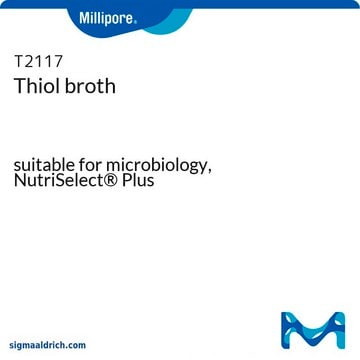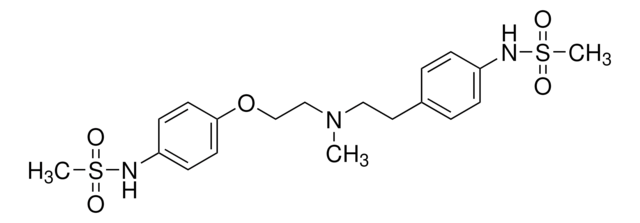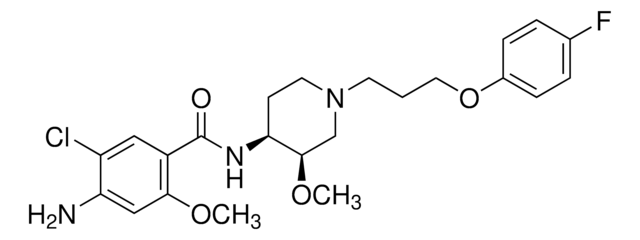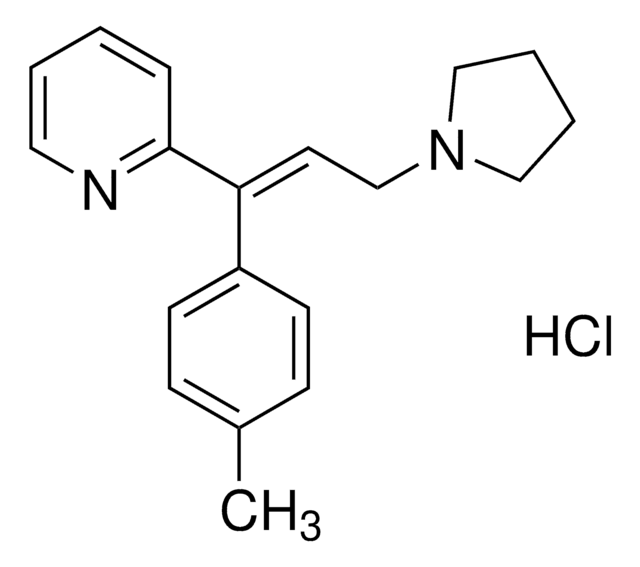T9652
Terfenadine
≥97.5% (HPLC), powder, H1 histamine receptor antagonist
Synonym(s):
α-[4-(1,1-Dimethylethyl)phenyl]-4-(hydroxydiphenylmethyl)-1-piperidinebutanol
About This Item
Recommended Products
product name
Terfenadine,
Quality Level
solubility
chloroform: soluble 250 mg plus 5 ml of solvent, clear to very slightly hazy, colorless to faintly yellow
H2O: soluble 0.01 mg/mL at 30 °C
1 M HCl: soluble 0.12 mg/mL at 30 °C
hexane: soluble 0.34 mg/mL at 30 °C
0.1 M tartaric acid: soluble 0.45 mg/mL
0.1 M citric acid: soluble 1.1 mg/mL
methanol: soluble 37.5 mg/mL at 30 °C
ethanol: soluble in salt form 37.8 mg/mL at 30 °C
originator
Sanofi Aventis
storage temp.
2-8°C
SMILES string
CC(C)(C)c1ccc(cc1)C(O)CCCN2CCC(CC2)C(O)(c3ccccc3)c4ccccc4
InChI
1S/C32H41NO2/c1-31(2,3)26-18-16-25(17-19-26)30(34)15-10-22-33-23-20-29(21-24-33)32(35,27-11-6-4-7-12-27)28-13-8-5-9-14-28/h4-9,11-14,16-19,29-30,34-35H,10,15,20-24H2,1-3H3
InChI key
GUGOEEXESWIERI-UHFFFAOYSA-N
Gene Information
human ... ABCB1(5243) , CYP2C8(1558) , CYP3A4(1576) , HRH1(3269) , IL4(3565) , IL5(3567) , KCNH1(3756) , KCNH2(3757)
mouse ... Abcb1a(18671) , Abcb1b(18669)
rat ... Hrh1(24448)
Looking for similar products? Visit Product Comparison Guide
Application
Biochem/physiol Actions
Features and Benefits
Preparation Note
Hazard Statements
Precautionary Statements
Hazard Classifications
Aquatic Chronic 4
Storage Class Code
11 - Combustible Solids
WGK
WGK 2
Flash Point(F)
Not applicable
Flash Point(C)
Not applicable
Certificates of Analysis (COA)
Search for Certificates of Analysis (COA) by entering the products Lot/Batch Number. Lot and Batch Numbers can be found on a product’s label following the words ‘Lot’ or ‘Batch’.
Already Own This Product?
Find documentation for the products that you have recently purchased in the Document Library.
Customers Also Viewed
Articles
Discover Bioactive Small Molecules for ADME/Tox
Discover Bioactive Small Molecules for ADME/Tox
Discover Bioactive Small Molecules for ADME/Tox
Discover Bioactive Small Molecules for ADME/Tox
Our team of scientists has experience in all areas of research including Life Science, Material Science, Chemical Synthesis, Chromatography, Analytical and many others.
Contact Technical Service












